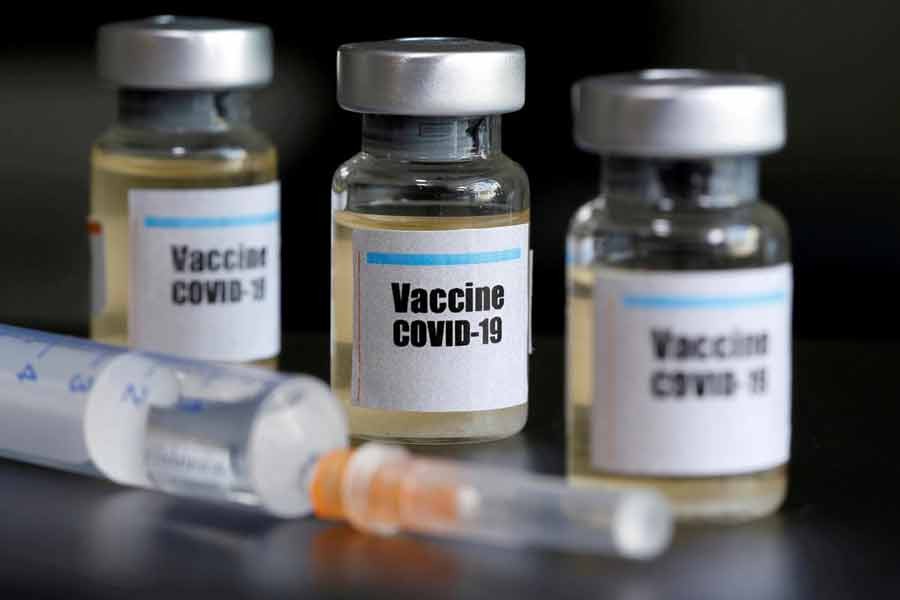When will Covid-19 vaccine be available in Bangladesh for mass inoculation? The vaccine developed by the Oxford-AstraZeneca is the one that has got regulatory approval so far to enter the country.
All men in authority are saying it will arrive on time. But there is an air of uncertainty as they are not giving any definite timeline.
A good number of statements issued following the interview given by the chief executive officer (CEO) of the Serum Institute of India (SII) to the effect that Indian government had slapped a ban on the export of vaccine had given rise to all the confusions.
The clarification of the SII CEO and all the reassuring statements issued at home and beyond on export and availability of the vaccine have not cleared the confusions.
The memorandum of understanding (MoU) signed between the government, the SII and the Beximco Pharma in early November in Dhaka says that the SII would start supplying the Oxford/AstraZeneca vaccine within one month from the date of 'emergency-use' approval given either by the World Health Organisation (WHO) or the UK's Medicines and Health products Regulatory Authority (MHRA) or the US Food and Drug Administration (USFDA).
The UK's MHRA gave the emergency-use approval on December 30 last. So, Bangladesh should receive the first instalment of 5.0 million (under the tripartite MoU, the SII is due to supply 30 million doses of the vaccine in equal monthly instalments in six months' period) during the current month.
The incumbent health minister also on several occasions had said that the first instalment of Oxford vaccine would arrive in Bangladesh in the last week of January or in the early part of February. But the latest developments do point to a likely delay in vaccine shipment by the SII.
In the event of delay in vaccine shipment, will there be a breach of agreement on the part of the SII? The answer is both yes and no. An MoU is a legal document, but it is not binding the way a contract is. On the day of the MoU signing, the Beximco Pharma had said that a formal contract would be inked within one month. It is not known whether there exists a formal contract on the supply of the vaccine.
Given the assurance coming from none other than the Indian Prime Minister, it is certain that the SII vaccine would reach Bangladesh. But it might not be in line with the period as agreed upon in the MoU.
Under the prevailing circumstances, questions are being asked about the country's dependence on one single source for vaccine import. Most countries have been trying to procure vaccine from multiple sources. Vaccines developed by the Chinese biotech firms Sinopharm and Sinovac could be effective alternatives. Some Gulf, Southeast Asian and South American countries have started inoculating their populations with the Chinese vaccines having efficacy rate over 80 per cent.
Sinovac had put forward a proposal in August last year to conduct a phase-three trial of its vaccine in Bangladesh. It looked certain that the International Centre for Diarrhoeal Diseases and Research, Bangladesh (ICDDRB) would be conducting the trial of the vaccine on a few thousand health workers. But the process for unexplained reason/s was stalled.
It could be because of the foot-dragging by the health authorities in approving the trial. The Sinovac's proposal, put forward in September, to co-finance the cost of the trial by Bangladesh might also be the reason for shelving the proposal. A few sceptics, however, suspect some 'outside' intervention in the matter.
The scope of procuring vaccines within a short period from sources other than the one being produced by the SII remains very limited, for now. The country cannot afford the vaccines being churned out by Pfizer-BioNTech or Moderna, primarily, on technical reasons. Price here is a factor. The absence of the facilities to preserve and transport of the vaccines remains the number one problem. More importantly, the rich countries have pre-booked vaccines. It would take months for the relevant vaccine producers to supply the pre-booked vaccines. Bangladesh might get the vaccine in an unspecified number of doses from the Covax, the global collaboration formed to face the pandemic, in February or March next. The number is likely to be far too small to meet the country's requirement.
The government is also unlikely to allow the private import of the vaccine now. Such a move might trigger some unpalatable issues such as the rich-poor divide.
Under the prevailing circumstances, the country has no other alternative but to wait for the SII vaccine. Yet the wait might prove beneficial in the sense that some health safety and efficacy issues relating to the Oxford vaccine might come up in the meanwhile. In that case, the vaccination would be an informed one, to some extent.
The availability of Covid vaccines and then inoculating the population with the vaccines are two different issues. The government reportedly have chalked out a vaccination programme covering all the six phases of vaccine delivery by the SII. According to newspaper reports, the elderly people in their 80s will get the jab alongside the health professionals and workers dealing with Covid patients and freedom fighters.
People above the age of 60 and above should be in the first phase of the inoculation programme. People of this age group constitute more than 70 per cent of the lives claimed by the Covid-19. Protecting these people from Covid would help reduce the workload and risks of the relevant health professionals and workers.


